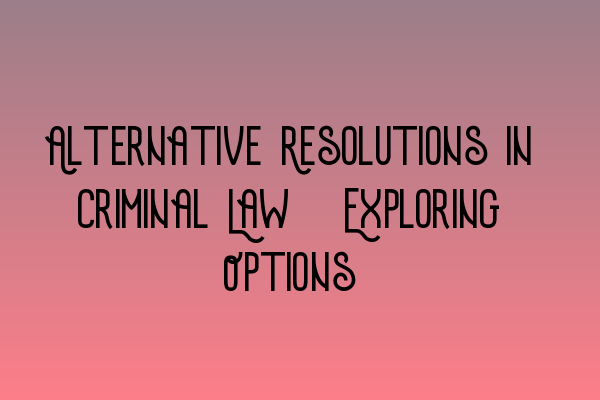Alternative Resolutions in Criminal Law: Exploring Options
Criminal law cases can often be complex and emotionally charged. In many instances, the traditional route of a trial may not be the best course of action for all parties involved. This is where alternative resolutions in criminal law come into play. In this article, we will explore the various options available and discuss their benefits and drawbacks.
1. Plea Bargaining
Plea bargaining is a negotiation process between the prosecution and the defense, where the accused agrees to plead guilty in exchange for a lesser charge or a reduced sentence. It often involves presenting evidence or arguments that may lead to a more favorable outcome for the defendant.
While plea bargaining has its critics, it can be a beneficial option for both sides. For the defendant, it can potentially result in a lighter sentence or the opportunity for rehabilitation programs. For the prosecution, it means avoiding the time and cost of a lengthy trial.
Read more about SQE 1 Practice Exam Questions that cover topics related to plea bargaining.
2. Diversion Programs
Diversion programs are alternatives to traditional prosecution aimed at diverting offenders away from the criminal justice system. These programs typically focus on rehabilitation and addressing the root causes of criminal behavior rather than punishment. They may include counseling, therapy, community service, or education programs.
Diversion programs can be a win-win situation for both the individual facing criminal charges and society as a whole. The accused gets the chance to address underlying issues and avoid a criminal record, while the community benefits from reduced recidivism rates.
If you’re interested in learning more about diversion programs, check out our SQE 2 Preparation Courses that cover this topic in detail.
3. Restorative Justice
Restorative justice focuses on healing the harm caused by a crime by bringing together the victim, the offender, and the community. It prioritizes repairing the relationships broken by the offense and finding solutions that address the needs of all parties involved.
This approach encourages accountability and empathy, giving the victim a voice and the offender an opportunity to make amends. Through dialogue and mediated discussions, restorative justice aims to bring about a sense of closure and reconciliation.
For more information on restorative justice and its role in the criminal justice system, explore our SQE 1 Practice Mocks FLK1 FLK2 that provide comprehensive coverage on this topic.
4. Mediation
Mediation is a voluntary process where a trained mediator facilitates communication and negotiation between the parties involved in a criminal dispute. It focuses on finding common ground and mutually acceptable solutions, rather than pursuing adversarial litigation.
Mediation can be particularly effective in resolving non-violent offenses, as it allows both sides to have a say in the outcome and encourages cooperation. It often leads to practical and creative resolutions that are tailored to the specific circumstances of the case.
Learn more about the benefits of mediation and its application in criminal law through our SQE 1 Preparation Courses specifically designed to help you excel in criminal law.
Conclusion
Alternative resolutions in criminal law provide valuable options for both defendants and the criminal justice system as a whole. From plea bargaining to diversion programs, restorative justice, and mediation, these alternatives allow for more tailored and potentially more favorable outcomes.
It is important for legal professionals to be well-versed in these alternative resolutions, as they can offer opportunities for resolution that better serve the needs of all parties involved. Being knowledgeable about the various approaches and their potential benefits can help lawyers effectively advocate for their clients and contribute to a more efficient and fair criminal justice system.
If you’re interested in keeping up-to-date with the latest developments in criminal law or learning about SRA SQE Exam Dates, be sure to regularly visit our website for more informative articles and resources.
